The Nexus 7 (2013) Review
by Anand Lal Shimpi on August 22, 2013 6:00 PM ESTPlatform Power & Battery Life
The new Nexus 7 moves to a slightly smaller battery compared to its predecessor (15Wh vs. 16Wh). The result however is anything but a reduction in battery life. ASUS and Google worked hard to reduce platform power consumption as much as possible. I instrumented both Nexus 7s and measured total platform power, excluding display, to look at the impact of the silicon platform (SoC, PMIC, DRAM, eMMC, WiFi, etc...). The results are beyond impressive:
Idle power is cut in half compared to last year's model. This is by far the most important improvement as most mobile usage models tend to have long periods of idle time. We'll see these power gains reflected in our web browsing test which does have significant periods of simulated reading time between web page loads. The power reduction while running Kraken grows to just over 20%, and even while running Geekbench 3 we see a 16% drop with the new Nexus 7. Only our offscreen 3D test manages to draw more power on the new Nexus 7 than the old one, and that isn't taking into account the nearly 5x increase in performance on the new Nexus. In fact, as impressive as these numbers are - they are even more impressive when you take into account performance. To make a long story short, don't worry about the ~7% decrease in battery capacity as there are enough improvements in platform power and performance (and thus perf per watt) to more than make up for the smaller battery.
We'll start out with our WiFi web browsing test. Like all of our battery life benchmarks we run this test with all devices calibrated to 200 nits and connected to 5GHz 802.11 WiFi (if supported). The test itself cycles through a bunch of desktop websites at a very aggressive frequency. Our test ensures that both the CPU cores and wireless stack can reach their deep sleep states during simulated reading periods. The test continues until the battery is depleted.
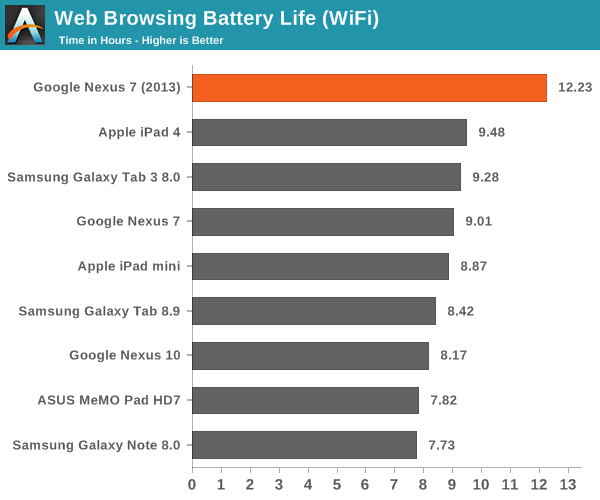
The new Nexus 7 does better here than any other small tablet we've ever tested. Remember that 50% decrease in idle platform power? That's exactly why we're seeing a 35% improvement in battery life compared to the original Nexus 7.
Our video playback test involves looping the playback of a 4Mbps 720p High Profile H.264 transcode of the last Harry Potter Blu-ray. All displays are calibrated to 200 nits.
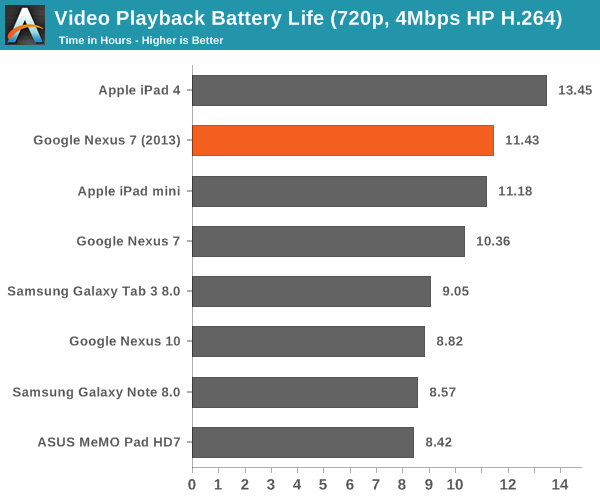
Video decode blocks are fairly well optimized to begin with, so there's not a ton of room for improvement here compared to last year's Nexus 7. Despite the ~7% shrink in battery capacity, the new model manages a 10% increase in battery life though. We also have the first small Android tablet capable of beating the iPad mini in a video playback test here - job well done ASUS/Google.
Our final test involves looping the Egypt HD benchmark until the battery is completely drained. Frame rates are capped to 30 fps to somewhat simulate actual gameplay and not penalize faster GPUs.
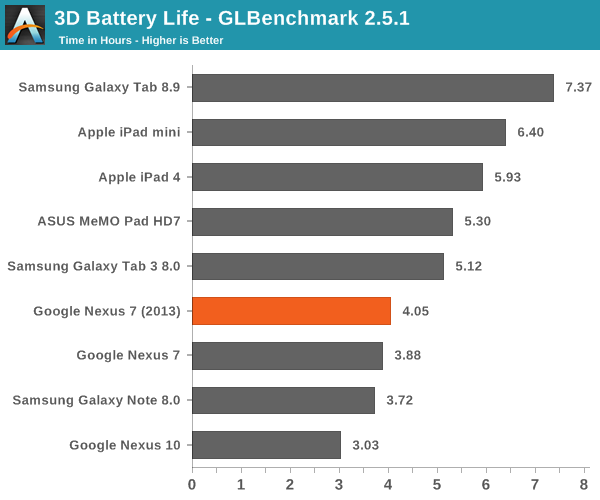
The new Nexus 7 manages to deliver slightly better battery life here despite driving higher frame rates and more pixels. Overall performance here isn't anything super impressive, the only average showing from the Nexus 7.
Google ships the Nexus 7 with an ASUS branded 7W charger, identical to the one you'd find in the box of a MeMO Pad HD7. Given identical chargers and battery capacities, there's no surprise the new Nexus 7 takes the same amount of time to charge as the MeMO Pad HD7 (~3.5 hours).
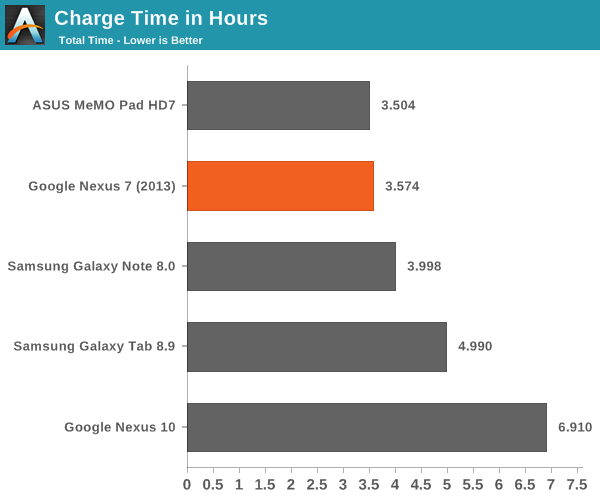
The new Nexus 7 also supports wireless charging by implementing the Qi standard. Charge time is a bit slower wirelessly as Qi can only charge at up to 5W. Brian tested Qi functionality in his mini review of the Nexus 7 and didn't have any issues.


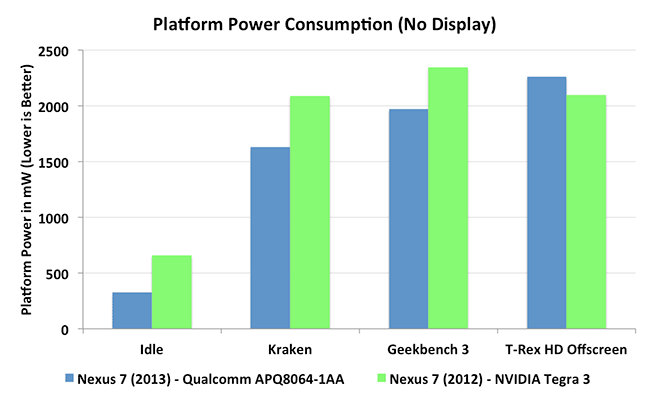
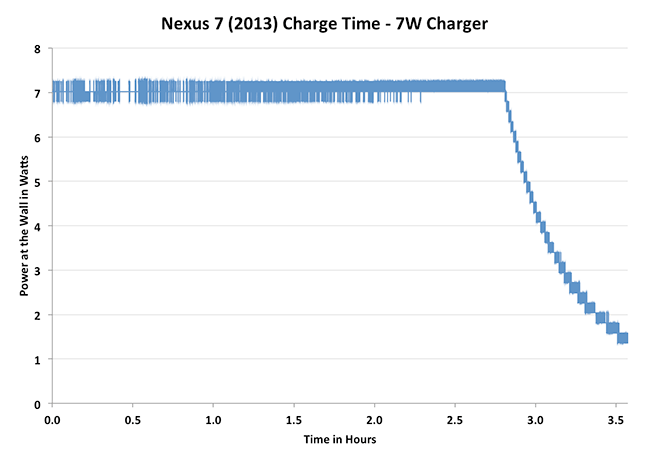








202 Comments
View All Comments
justacousin - Tuesday, September 3, 2013 - link
Sorry, what I meant to ask was: So what is going to be Nexus' next steps to improving their device?harrydevlin - Monday, September 16, 2013 - link
One big difference that is often overlooked when comparing tablets is the presence or absence of a GPS. The Nexus tablets all have a GPS receiver, even in the Wi-Fi only versions. iPads do not have a GPS receiver in the Wi-Fi only versions.Some of the most compelling tablet apps require a GPS receiver. For example, using a tablet as a GPS mapping device, with stored maps, requires a GPS.
shermanx - Wednesday, October 2, 2013 - link
the battery doesn't seem right for mine. I guess either I got a defective unit or this review did it with a "tablet sheet battery". I get maybe half of what's claimed here and the battery seems to drain very fast even when I don't use the tablet (battery dies in 2-3 days if I leave it idle).sireangelus - Saturday, October 5, 2013 - link
Would you ming having an article on the nexus 7 2012 slow charging issue ??? it's frustrating. Maybe if you make a fuss something will be done about it- like warranty extension of something.SOORAJ - Wednesday, October 9, 2013 - link
when it will be launched in India? and what will be the price?lookit77 - Saturday, October 12, 2013 - link
How about a review of the LTE version of the Nexus 7 or an update to this review?Eugene88 - Saturday, October 26, 2013 - link
I'm very curious about battery change. i.e. frequent usage of tablet drained battery, so it doesn't hold even for an hour. Is it possible to change battery? Haven't found any openings on tablet.Very well written article.
WillyJ - Wednesday, November 6, 2013 - link
Sadly, my daughter has shattered her display. Does anyone know a reliable source for replacement display assemblies?ESC2000 - Thursday, January 2, 2014 - link
You know it's actually surprising to me how the nexus 7 blew the original iPad mini out of the water in every test except for one. Granted the original mini was a three months from the end of its life cycle. Apple is still selling it, though, for a super inflated price of $300, which makes it somewhat in the nexus 7's price range. The reins mini at $400 may surpass the nexus 7 but is not a good value with its low functionality:price ratio.I just remember the constant arguments with apple fans claiming the original mini was better than the nexus 7 2013, and I think the lopsided nature of these numbers shows that objectively it was not better (although in individual cases there may be some reason to purchase it over the nexus 7).
mittoo - Friday, January 10, 2014 - link
Nice review and a lot of insight on screen quality.I have on complaint though. Why is iPhone 5 included in the pixel per inch list? What, you don't like Google products on top? After praising the device so much you could let it have the top spot in that. Why randomly add a phone? And it is not like the iPhone 5 has the highest ppi either.